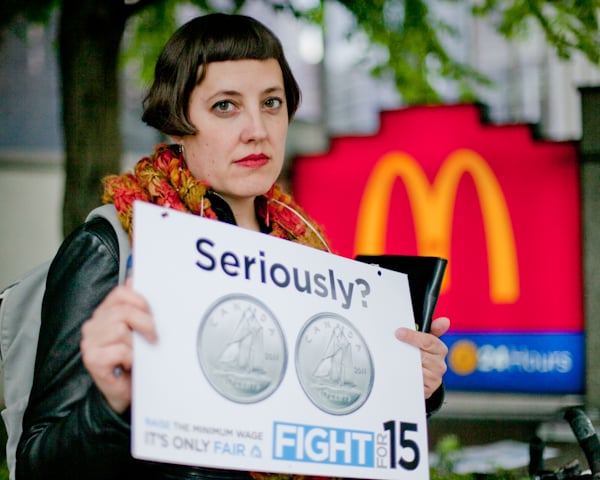When should B.C.’s minimum wage reach $15, as promised in the NDP’s election campaign?
Employer groups and small business owners have offered wildly different answers at public meetings held by the Fair Wages Commission around the province this fall.
Established in October, the commission is tasked with advising the provincial government on the timeline for minimum wage increases.
While workers and their advocates have consistently pushed for a swift increase to $15, the commission’s chair, economist Marjorie Griffin Cohen, told The Tyee that feedback from employers have offered a range of views.
“Some don’t want the minimum wage to increase at all, or want it to increase over a 10-year period,” she said. “Others recognize that it needs to happen fairly quickly.”
The Tyee attended meetings in Abbotsford and Vancouver and heard presentations by business organizations, unions, think tanks and community groups, as well as individual workers and business owners.
In Abbotsford, farmers and agricultural organizations warned that a sudden increase in the minimum wage could lead to increased mechanization of farm work. This would mean the loss of farm jobs, they said, often the first employment for young people and newcomers to Canada.
Farmers are just trying to survive, one blueberry farmer said, and have to compete with farms in the U.S. that produce food much more cheaply.
Some farmers and agricultural groups also called for policies to help farmers with labour costs — tax credits for hiring young workers, for example. Agriculture is operating in a highly competitive environment, and governments should not regulate in ways that make it harder, said one fruit grower.
Linda Santi, executive director of the B.C. Greenhouse Growers' Association said that small family farms don’t have the resources to cope with rapid increases in the minimum wage. Greenhouse growers need time to mechanize, she said, so they can keep labour costs down.
Delli Santi said a higher minimum wage will increase food costs, leading to low-income families possibly buying less nutritious food. She recommended the increase to $15 happen over four years.
But farm owner Chris Bodnar of Close to Home Organics said he already pays his workers more than the minimum wage and provides benefits that bring the value of their compensation to more than $15 per hour.
Bodnar acknowledged the financial struggles experienced by many farm owners but noted that policy changes — such as restrictions on food imports and apprenticeship programs for agricultural workers — could support the industry and make wage increases more manageable. Letting the market decide on wages for farm workers, he said, is an abdication of regulatory responsibility.
“No one should have to live in poverty so that someone else can have cheap food,” said Bodnar.
There was a similar gap between the views of industry groups and small business owners in Vancouver.
Tim McEwan, senior vice-president of the Independent Contractors and Businesses Association of BC, cited a University of Washington study that showed hours of work for low-wage employees declined in Seattle after a 2016 boost to the minimum wage.
McEwan recommended the government raise the minimum wage to $15 by 2022, a suggestion echoed by representatives from Restaurants Canada and other business groups. Raising the wage over a period of five years instead of 15 months would decrease job loss and business closures, said George Higgins from the Coalition of BC Businesses.
At least two small business owners who spoke at the Vancouver meeting disagreed with this suggestion.
Channing Guenther, co-owner of One Stop Shop: Cards & Games, pays his employees $20 per hour, a wage he and his co-owner based on Vancouver’s living wage of $20.62.
“We’d like to move up in the world, too, but I’d rather our employees get a fair wage,” he said.
Guenther acknowledged that many businesses have tight margins but said employers should strive to pay fair wages however they can. A higher minimum wage, he said, would give people a better quality of life and put money back into the local economy.
Andrea Smith, a co-owner of the East Vancouver bike shop Sidesaddle, expressed the same perspective. Smith said she and her business partner have never paid their employees less than $15 an hour, even during the shop’s first year of operation.
“It’s embarrassing that small business argues so strongly against raising the minimum wage,” she said. A business model based on underpaying staff is a bad business model, she said.
Smith said she takes pride in paying her staff well, but B.C.’s current minimum wage of $11.35 puts her business at a disadvantage. Since Sidesaddle pays a higher wage, they have to charge slightly higher prices. A $15 minimum wage, said Smith, would even the playing field.
Cohen said that despite their differences, business owners and employer groups agree on the need for predictable increases.
“They want no surprises,” said Cohen. “They find the huge volatility that there has been to the minimum wage in the past extremely problematic. They also have been pretty consistent in saying they want it to happen once a year, rather than a lot of smaller ones less frequently.”
Cohen said the regional meetings have been useful. In addition to feedback from business groups, she said, hearing directly from people earning low wages has been helpful.
“How people experience living on minimum wage is important for us to hear,” she said. “While we may know that this is very difficult, we now know why it’s difficult and in what areas it’s particularly difficult.”
The Fair Wages Commission’s final regional public meeting is scheduled for today in Cranbrook. The three-person commission — comprised of Cohen, the BC Business Council’s Ken Peacock, and union leader Ivan Limpright — will deliberate based on the presentations they’ve heard and other research.
The commission is expected to submit its first report to Labour Minister Harry Bains by the end of December. ![]()
















Tyee Commenting Guidelines
Comments that violate guidelines risk being deleted, and violations may result in a temporary or permanent user ban. Maintain the spirit of good conversation to stay in the discussion and be patient with moderators. Comments are reviewed regularly but not in real time.
Do:
Do not: